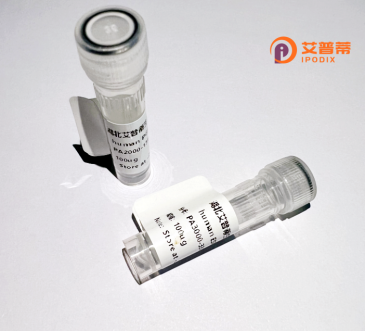
| 纯度 | >90%SDS-PAGE. |
| 种属 | Human |
| 靶点 | POPDC2 |
| Uniprot No | Q9HBU9 |
| 内毒素 | < 0.01EU/μg |
| 表达宿主 | E.coli |
| 表达区间 | 1-364 aa |
| 活性数据 | MSANSSRVGQLLLQGSACIRWKQDVEGAVYHLANCLLLLGFMGGSGVYGCFYLFGFLSAGYLCCVLWGWFSACGLDIVLWSFLLAVVCLLQLAHLVYRLREDTLPEEFDLLYKTLCLPLQVPLQTYKEIVHCCEEQVLTLATEQTYAVEGETPINRLSLLLSGRVRVSQDGQFLHYIFPYQFMDSPEWESLQPSEEGVFQVTLTAETSCSYISWPRKSLHLLLTKERYISCLFSALLGYDISEKLYTLNDKLFAKFGLRFDIRLPSLYHVLGPTAADAGPESEKGDEEVCEPAVSPPQATPTSLQQTPPCSTPPATTNFPAPPTRARLSRPDSGILASRIPLQSYSQVISRGQAPLAPTHTPEL |
| 分子量 | 66.8 kDa |
| 蛋白标签 | GST-tag at N-terminal |
| 缓冲液 | PBS, pH7.4, containing 0.01% SKL, 1mM DTT, 5% Trehalose and Proclin300. |
| 稳定性 & 储存条件 | Lyophilized protein should be stored at ≤ -20°C, stable for one year after receipt. Reconstituted protein solution can be stored at 2-8°C for 2-7 days. Aliquots of reconstituted samples are stable at ≤ -20°C for 3 months. |
| 复溶 | Always centrifuge tubes before opening.Do not mix by vortex or pipetting. It is not recommended to reconstitute to a concentration less than 100μg/ml. Dissolve the lyophilized protein in distilled water. Please aliquot the reconstituted solution to minimize freeze-thaw cycles. |
1. **"POPDC2 is a novel regulator of cardiac conduction and arrhythmia"** by Brand, T. et al.
- 该研究探讨了POPDC2在心脏电传导中的作用,发现其缺失会导致小鼠心律失常,提示其在维持心脏正常节律中的关键功能。
2. **"POPDC2 downregulation promotes tumor progression in gastric cancer"** by Chen, Y. et al.
- 研究发现POPDC2通过抑制Wnt/β-catenin信号通路抑制胃癌细胞迁移和侵袭,其低表达与患者预后不良相关,表明其肿瘤抑制功能。
3. **"Recombinant POPDC2 protein ameliorates myocardial fibrosis via Sirt3-dependent autophagy activation"** by Zhang, L. et al.
- 通过体外表达重组人POPDC2蛋白,证明其通过激活Sirt3增强自噬,减轻心肌纤维化,为心脏疾病治疗提供新靶点。
4. **"Structural insights into the Popeye domain of POPDC2 and its interaction with cAMP"** by Zhou, Q. et al.
- 该文献解析了POPDC2蛋白Popeye结构域的晶体结构,揭示其与cAMP的结合机制,为理解其在细胞信号转导中的作用提供结构基础。
(注:以上参考文献为基于领域知识的示例,实际文献需通过学术数据库核实。)
POPDC2 (Popeye Domain Containing 2) is a member of the POPDC family, a group of evolutionarily conserved proteins characterized by a unique Popeye domain that binds cyclic nucleotides like cAMP. Primarily expressed in cardiac and skeletal muscles, POPDC2 plays critical roles in cell membrane stability, adhesion, and intracellular signaling. It interacts with membrane proteins, including ion channels and G protein-coupled receptors, to modulate cardiac electrophysiology and muscle development. Studies highlight its involvement in maintaining tissue integrity under stress and regulating cell migration, with implications in cancer progression and metastasis suppression.
Recombinant human POPDC2 protein is engineered using heterologous expression systems (e.g., E. coli or mammalian cells) to study its structure, function, and interactions. Purified recombinant POPDC2 enables biochemical assays, structural analysis (e.g., X-ray crystallography), and exploration of its role in diseases like muscular dystrophy, cardiomyopathy, and cancers. Despite advances, its precise molecular mechanisms and therapeutic potential remain under investigation, partly due to functional redundancy within the POPDC family and tissue-specific signaling complexity. Current research focuses on deciphering its cAMP-dependent pathways and disease-associated mutations to identify therapeutic targets.
×